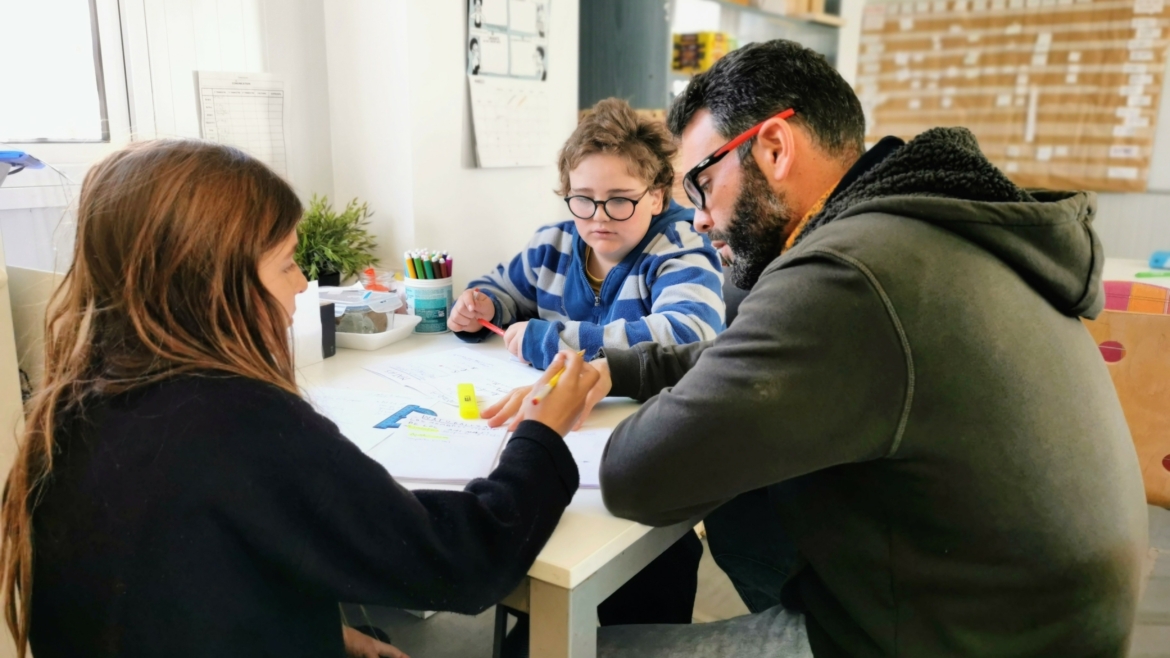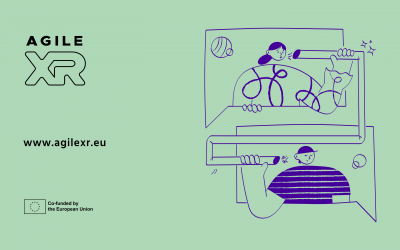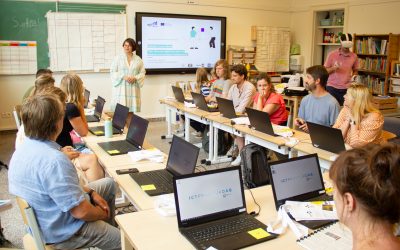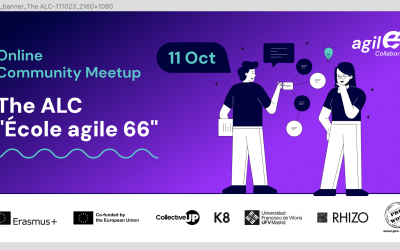We are proud to give you a behind-the-scenes look at the Origami Agile Learning Center (ALC) in Madrid, Spain, in our next chapter of sharing stories from Agile actors. In this in-depth interview with José, the founder of the ALC, we explore this progressive school’s unique aspects that foster self-directed learning and encourage a sense of community among its learners.
This interview took place online, between the team members of A4C and José. We had the opportunity to discover truths and debunk myths about the live and learning in an ALC. With this interview, teachers and those interested in alternative education will find valuable insights into the day-to-day functioning of an Agile Learning Center.
Q1: How does the Origami ALC work with mixed-aged student groups?
José: At Origami, we have 110 students aged between 3 and 12. We organize them into groups, or circles, as we call them in sociocracy. The circles are not strictly divided by age but are based on the activities offered that day and the skill levels needed for participation. Our main goal is to facilitate collaboration and skill-building among students of different ages with similar interests.
Q2: What has been the evolution of the school’s educational approach?
José: Our educational approach has remained consistent since our inception four years ago, with the learning cycle of intention, practice, reflection, and sharing at its core. We encourage our students to set their learning goals and then help them identify the steps and strategies needed to achieve them. The learning process always starts with their intentions.
Q3: How do you manage students’ intentions and map them to learning objectives?
José: Most – but not all – learning intentions are connected to self-selected projects students are working on, with day-to-day purposes related to the overall project. Once the project is selected and framed by a student, facilitators can start to map students’ intentions to learning objectives, ensuring their projects align with the US-based curriculum standards we follow. One project typically takes around four weeks to complete.
Q4: Do you offer direct instruction? If yes, how and when?
José: We remain flexible and can decide on direct instruction based on daily needs. For example, when we wanted to measure the speed of cars in front of our school, connected to an intention in a project, we provided direct instruction on Cartesian coordinates and physics concepts to enable students to carry out the project. We also offer scheduled surface learning sessions, where students learn the absolute basics for reading, writing, maths or more specific topic for older children. These sessions aim to give them the minimum input needed to stimulate deeper and more independent learning of subjects. Direct instruction is also often given by the facilitator on a one-on-one basis, which allows us to tailor the instruction to the learners’ needs.
Q5: How do you assess students’ learning?
José: We assess learning through continuous observation, interviews, and formative assessment tools like peer assessments, scripts, rubrics, and videos. We hold weekly meetings with the facilitators and with the students to discuss students’ progress and share observations with parents. We do not use formal assessment instruments like exams or tests.
Q6: How do you support students who struggle with self-regulated learning?
José: We use tools like the set-the-day board, which helps students visualize their daily intentions and tasks. This keeps them accountable and allows us to follow up on their daily progress. The challenge is when learners do not keep their agreements, and we must resolve conflicts. For some learners, self-regulation comes easier than for others, so we always try to be there to offer support when needed.
Q7: How do you handle students who focus on one subject at the expense of others?
José: We believe in the importance of intrinsic motivation. If a student is genuinely interested in one subject, we support their exploration of it. However, if they avoid a topic out of fear or a past negative experience, we provide one-on-one instruction to help them overcome their reluctance.
Q8: Does a curriculum go against self-directed learning?
José: No, a minimal curriculum based on questions can be helpful. The key is to keep the curriculum lean and avoid turning it into a checklist. A minimum curriculum helps us identify obstacles and supports reflection with learners.
Q9: How do you make your school more inclusive regarding financial barriers?
José: We offer social and regular pricing, allowing parents to choose how much they pay within a set range. We strive to make our school affordable while providing good conditions for our facilitators.
Q10: How do you recruit agile learning facilitators?
José: Hiring the right facilitators is critical for our learning environment. At our center, we differentiate between teachers and facilitators. Teachers have an official teaching degree and experience with agile facilitation. At the same time, facilitators are familiar with agile facilitation but bring additional specific expertise or past working experience to the center. They are often not trained as teachers but bring valuable offerings to our community. This mix of teachers and non-teachers creates a unique dynamic at our ALC. When recruiting personnel, we seek individuals with a strong background in empathy, patience, and the ability to facilitate learning without imposing their agenda. Fortunately, finding teachers and facilitators is relatively easy for us since alternative education is quite popular in and around Madrid, with over 60 smaller and larger initiatives.
Q11: What role do parents play in the Agile Learning Center?
José: Parental involvement is essential. Parents are encouraged to participate in school events, attend a day at the centre to observe and experience our approach and contribute to the learning community by sharing their skills and knowledge in our so-called offerings. We also regularly have a parent circle meeting to discuss school operations and ensure parents’ voices are heard.
Q12: What does a typical day look like at Origami ALC?
José: A typical day starts with a morning circle where students share their intentions for the day. They then engage in self-directed learning, working on their projects and goals. Students can access various resources, such as circle offerings, surface learning sessions, learning materials, and facilitators, to support their learning. We break for lunch, followed by a reflection circle where students discuss their progress and challenges. The day ends with free time for play and socializing.
Q13: What challenges have you faced in implementing the ALC model?
José: The most significant challenge we have faced is helping parents and students adapt to the ALC model, which differs from traditional education. Developing self-regulation skills takes time, and parents often need reassurance about the effectiveness of our approach, which requires trust. One of the difficulties is that we cannot yet see the long-term results of our efforts. However, if parents or anyone experience the magic of an agile learning center and discover the power of natural learning, they start building trust by feeling and witnessing the effectiveness of our approach.
Q14: What is the future for Origami ALC and the Agile Learning Center movement?
José: Our goal is to expand the Agile Learning Center to include learners up to 18 years old, starting with learners up to 14 years old next year. This growth requires us to rebuild our school, which is challenging and exciting. However, it provides a great learning and culture-building opportunity for our community to create a space where we all feel at home to live and learn. For the ALC movement, we aim to inspire more schools worldwide and improve our current practices. We will continue fostering a community of passionate learners, educators, and parents and contribute to a global shift towards more inclusive and self-directed education.
The Origami Agile Learning Center in Madrid offers a unique learning environment that promotes self-directed learning, collaboration, and a strong sense of community. As an alternative to traditional education, the ALC model fosters intrinsic motivation and empowers students to take charge of their learning journey. By maintaining a flexible curriculum, a lean structure, and an emphasis on individual goals and projects, Origami ALC exemplifies the potential of innovative educational approaches to create a more inclusive, engaging, and effective learning experience for all students.
If this interview has sparked your interest and you’re eager to learn more from José, we invite you to join our next online community meeting in May. During the meeting, you’ll have the opportunity to connect directly with José and other like-minded individuals to discuss your shared interests. Follow our social media channels to be the first to know the meeting date, and don’t miss out on this opportunity to connect and learn from José and others in our community.











0 Comments